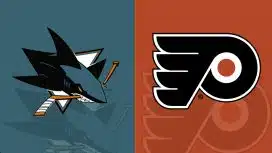By Kevin Durso, Sports Talk Philly editor
For eight seasons, from 1992 to 2000, Eric Lindros was the central figure on the Flyers.
Big E wore the 'C' as captain of the team for six of those seasons. He played on one of the most famous lines in franchise history. He may have even surpassed some of the team records had he not run into injuries woes and suffered multiple concussions that derailed his career. But make no mistake about it, at a time when the likes of Gretzky and Lemieux were in the twilight of their careers and Yzerman, Jagr, Sundin and Shanahan were headlining the NHL, Lindros stood among them.
He'll stand among them again on Monday, as he joins the Hockey Hall of Fame, along with Sergei Makarov, Rogie Vachon and Pat Quinn.
Lindros' career, to some, will be marred from the injury history, the fact that he only played 80 or more games in a season just once — in 2002-03 with the Rangers — and his highest games played total as a Flyer was 73 games in 1995-96. What he did when he was on the ice was what set him apart.
Lindros was a combination of speed and strength, mountainous to move, tough in the dirty areas but able to make a silky play as well. And he could score.
He had 41 goals and 34 assists in his rookie season. He followed that up with a 97-point season in 1993-94. In a lockout-shortened season of 1994-95, he had 70 points in 46 games on his way to winning the Hart Trophy.
Then came the real game-changer. The Flyers acquired John LeClair in 1995 and the "Legion of Doom" was born as LeClair joined a line with Lindros and Mikael Renberg. Lindros had reached career-highs across the board in 1995-96,with 47 goals, 68 assists and 115 points. In 1996-97, he played in just 52 games, but had 79 points.
Every season, Lindros was a point-per-game player and helped the Flyers reach the playoffs every season.
But turmoil within the organization around Lindros' injuries — a series of concussions, culminating with one final one in the 2000 Eastern Conference Final on a hit by Scott Stevens in Game 7, as well as a collapsed lung caused by internal bleeding that nearly went undiagnosed — created tension between Lindros' family and the Flyers organization.
With Lindros sidelined from his fifth concussion since joining the league, he declined a two-way qualifying offer from the Flyers for the 2000-01 season and ultimately did not play as the Flyers refused to trade his rights. They finally did prior to the 2001-02 season, sending him to the Rangers.
Tensions seemed to remain between the Flyers and Lindros for almost a decade, until the 2012 Winter Classic, when Lindros returned as part of the Alumni Game. His reception was warm and welcoming, like that of a reunion between old friends. Flyers fans embraced No. 88 again, and all was right between Lindros and the Flyers organization.
Since then, it's been a great relationship for Lindros and the Flyers, though he did turn down the team's request to potentially make a comeback at the NHL in 2012. Lindros and LeClair reunited in 2014 as they were both inducted into the Flyers Hall of Fame on Nov. 20 of that year. Lindros was also part of the Flyers Hall of Fame Heritage Night earlier this season and will also attend Captain's Night later in February. He is also slated to play in the Alumni Game between the Flyers and Penguins this season, joining his former linemates on the Legion of Doom.
What Lindros did on paper in terms of statistics is only half of what brings him to the Hall of Fame. This is a leader, a player who helped carry his team to the precipice of greatness on numerous occasions. This is a player who showed a work ethic of great proportions, who wanted to be the best and was among the best until injuries brought everything to a halt.
Lindros had noticeable traits of a Hall of Fame talent, as recognized by Lindros' childhood hero, Bobby Clarke, and his former linemate, LeClair.
"Yes, based on his ability to play the game and based on his contributions as a player," Clarke said to CBC in 2007 regarding if Lindros should be a Hall of Famer. "When he played for the Flyers, it was just outstanding, dominant hockey — the first of the huge, big men with small man's skill."
"He changed the way teams played against the Flyers," LeClair wrote in an article for the Flyers website. "Their first thought was: 'How am I going to play against Eric tonight? How am I going to stop him?' It mentally affected teams before the puck even dropped.
"He was their main focus. They would try to match their top checking line and top defensive pair against him. Eric had a temper because he was so competitive, so they'd try different things. It was a constant chess match to try to see if they could get Eric off his game, which ended with poor results."
To put it in perspective, the Flyers won 313 games in the eight seasons Lindros was with the Flyers. Lindros himself provided 659 points in his career with the Flyers, sixth in franchise history. He is tied for sixth in franchise history in assists with 369. His 290 goals ranks ninth in Flyers history.
By all standards, Lindros deserves his Hall of Fame status, even with his career cut short. He takes his place forever among hockey's greatest on Monday night.







